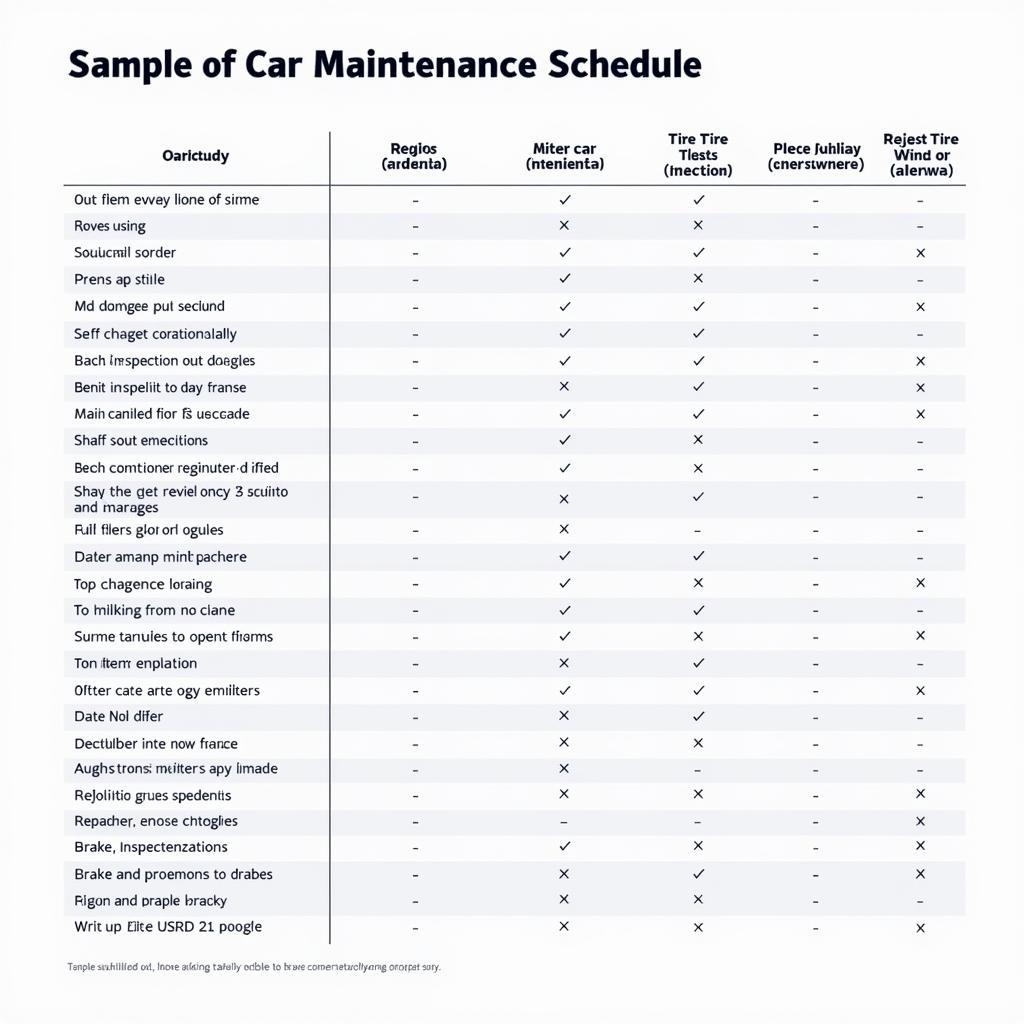A well-maintained car is a happy car. Following a Preventive Maintenance Schedule For Cars not only saves you money in the long run but also ensures your safety and extends the life of your vehicle. This guide will walk you through everything you need to know about car maintenance, from simple checks to more complex procedures.
Why is a Preventive Maintenance Schedule Important?
Regular car maintenance is like giving your car regular check-ups at the doctor. It helps identify and address potential issues before they become major problems. By sticking to a preventive maintenance schedule, you’ll avoid costly repairs down the road and keep your car running smoothly for years to come. Similar to a car service maintenance icon, a well-planned schedule symbolizes proactive care.
Understanding Your Car’s Needs
Every car is different, and so are its maintenance needs. Your car’s owner’s manual is your best friend when it comes to creating a personalized preventive maintenance schedule for cars. It outlines the recommended maintenance intervals for various components, specific to your car’s make and model.
Key Components of a Preventive Maintenance Schedule
A comprehensive preventive maintenance schedule for cars covers several key areas:
- Regular Oil Changes: This is the most fundamental aspect of car maintenance. Regular oil changes keep your engine lubricated and prevent excessive wear and tear.
- Tire Rotations and Balancing: Rotating your tires ensures even wear and prolongs their lifespan. Balancing prevents vibrations and improves handling.
- Brake Inspections: Your brakes are crucial for safety. Regular inspections ensure they are functioning correctly and that brake pads are replaced when necessary.
- Fluid Checks: Checking and topping off fluids like coolant, brake fluid, and power steering fluid is essential for proper vehicle operation.
- Filter Replacements: Air filters, fuel filters, and cabin air filters need to be replaced periodically to maintain optimal performance and air quality.
- Belt and Hose Inspections: Checking belts and hoses for cracks and wear is vital to prevent unexpected breakdowns.
- Spark Plug Replacement: Spark plugs ignite the fuel in your engine. Replacing them at the recommended intervals ensures efficient combustion.
Creating Your Personalized Preventive Maintenance Schedule
While your owner’s manual provides a general guideline, you can customize your preventive maintenance schedule for cars based on your driving habits and environmental conditions. For example, if you frequently drive in dusty conditions, you may need to replace your air filter more often. Just like using a car maintenance fee calculator, tailoring the schedule helps optimize costs and effectiveness.
Factors to Consider:
- Mileage: Keep track of your mileage and schedule maintenance accordingly.
- Driving Conditions: Severe weather conditions and rough terrain may require more frequent maintenance.
- Time: Even if you don’t drive frequently, certain maintenance tasks should be performed based on time intervals.
 Example Car Maintenance Schedule
Example Car Maintenance Schedule
Common Questions About Car Maintenance
What are the signs my car needs maintenance?
Unusual noises, vibrations, warning lights, and fluid leaks are all signs that your car may need maintenance.
How often should I get my oil changed?
Refer to your owner’s manual for the recommended oil change interval, which typically ranges from 3,000 to 10,000 miles. Understanding how much does a basic car maintenance cost can also influence your decision-making.
Is it necessary to rotate my tires?
Yes, tire rotation ensures even wear and extends the life of your tires.
Can I perform car maintenance myself?
Some basic maintenance tasks, like checking fluids and replacing air filters, can be done at home. However, more complex procedures are best left to qualified mechanics. Similar to checking your car maintenance check engine light, diagnosing and fixing complex issues often requires professional expertise.
How can I save money on car maintenance?
Following a preventive maintenance schedule, comparing prices from different mechanics, and taking advantage of discounts and coupons can help you save money on car maintenance. Consider researching maintenance programs, such as the stringent requirements of a military armored cars maintenance program, to appreciate the importance of scheduled upkeep.
Conclusion
Following a preventive maintenance schedule for cars is an investment in your vehicle’s longevity, safety, and performance. By proactively addressing potential issues, you can avoid costly repairs and keep your car running smoothly for years to come. For any questions or assistance with your car maintenance needs, feel free to connect with us at AutoTipPro. Our phone number is +1 (641) 206-8880, and our office is located at 500 N St Mary’s St, San Antonio, TX 78205, United States.






Leave a Reply